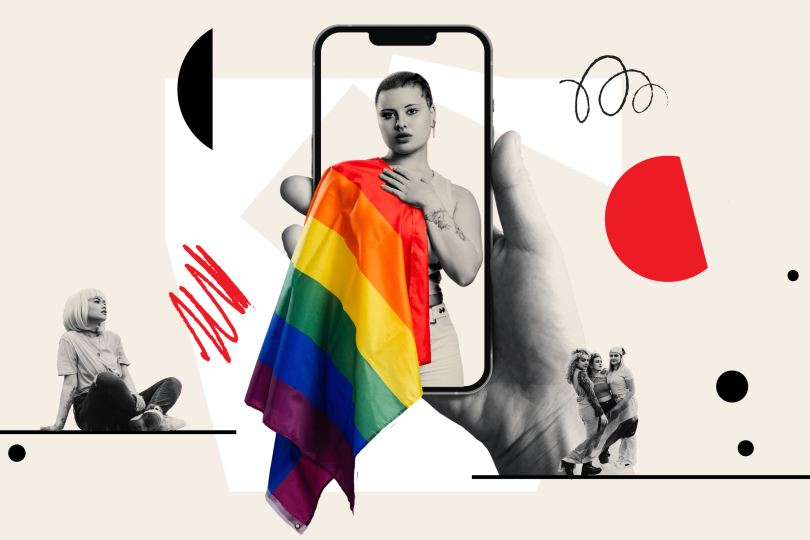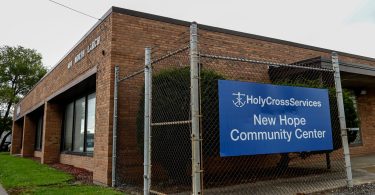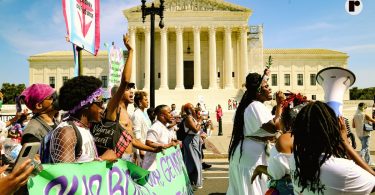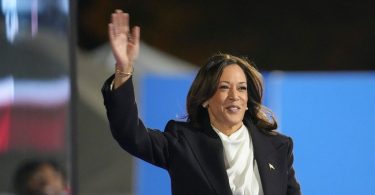Gen Z has bucked social trends time and time again, often creating their own. But one thing social scientists have yet to fully explain?
Gen Z’s increasingly different experience with sexuality.
According to a recent PRRI report, nearly 30 percent of Gen Z identifies as LGBTQ+. That’s a high figure when you take into account Baby Boomers only identified as LGBTQ+ 4 percent of the time. Even compared to millennials, Gen Z is a notably more sexually fluid generation, as millennials only identified as LGBTQ+ 16 percent of the time.
But what’s causing the younger generation, which includes those from age 12 to 27, to come out as gay, bisexual and the range of other identities included under the LGBTQ+ umbrella?
Roughly 30 percent of Gen Z identifies as LGBTQ+, which is far higher than both Baby Boomers and millennials.
Roughly 30 percent of Gen Z identifies as LGBTQ+, which is far higher than both Baby Boomers and millennials.
Photo-illustration by Newsweek/Getty
It likely lies in how they were raised, experts say.
“Gen Z is so much more likely to identify as LGBTQ because this generation sees others living authentic lives,” Suzanne Ford, the executive director of San Francisco Pride, told Newsweek. “They actually have queer role models to look up to.”
Cultural norms and values regarding gender and sexuality are evolving, and Gen Z tends to have more access to supportive peer groups and mental health awareness, which encourages young people to explore and understand their true selves.
“This generation’s young people have greater access to sources of information, inspiration, and affirmation that are unencumbered and unfiltered by people who would otherwise seek to quash individual authenticity and courage,” Nguyen Pham, president of San Francisco Pride, told Newsweek.
Mary Louise Adams, a professor at Queen’s University and an expert in gender and sexuality, said ultimately the last 50 years of persistent activism from feminists, LGBTQ and transgender people have made it possible for young people to imagine lives that aren’t constrained by conventional expectations about gender or sexuality.
“The culture is shifting,” Adams told Newsweek. “People are raising their children differently than did parents in the 1960s, 70s, and 80s. Human rights legislation has given LGBTQ people recourse. Educators better understand the need to address the needs of all their students, including those who don’t want to or cannot conform to normative ideas about gender or sexuality.”
How Will Gen Z Change The World?
As more Gen Z-ers identity as LGBTQ+, there could be plenty of widespread changes in the workplace and society overall, said the co-founders of LGBTQ+ business community myGwork, Adrien and Pierre Gaubert. Gen Z is projected to make up a third of the workforce by 2030, so workplaces will likely need to fall in line the younger generation’s expectations around inclusivity and equity.
“This trend may also enhance mental health awareness and reduce discrimination, benefiting overall well-being. In the workplace, greater LGBTQ+ representation can result in more inclusive environments, promoting innovation, creativity, and employee satisfaction,” Gaubert told Newsweek. “Companies prioritizing diversity and inclusion initiatives are also likely to see improved retention rates and a competitive edge.”
A recent mGwork study showed eight out of 10 Gen Z-ers would avoid applying for a company that had withdrawn its support for the LGBTQ+ community, and seeing visible LGBTQ+ role models in senior ranks would influence 80 percent of Gen Z-ers to accept a job from an employer.
“It’s crucial for companies to recognize and embrace the unique skills, perspectives and expectations of this tech-savvy, socially conscious and purpose-driven generation,” Gaubert said. “They seek genuine allyship, where actions speak louder than rainbow lanyards and hollow promises. For them, workplace authenticity isn’t negotiable. It’s the cornerstone of trust and loyalty.”
While Adams said LGBTQ Gen Z-ers still face their fair share of challenges, the tide is shifting, and being able to come into your identity is becoming a more integral part of society.
“It’s still not always easy for LGBTQ young people, but the existence of widespread support in person and online means that when things are hard, including politically, people are not struggling or advocating on their own,” Adams said.
Uncommon Knowledge
Newsweek is committed to challenging conventional wisdom and finding connections in the search for common ground.
Newsweek is committed to challenging conventional wisdom and finding connections in the search for common ground.







